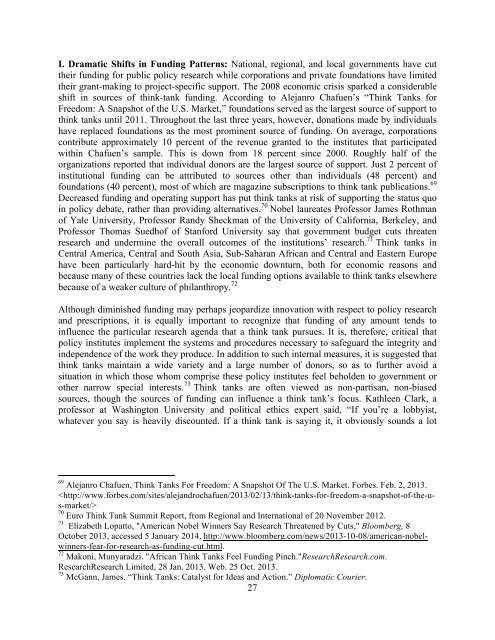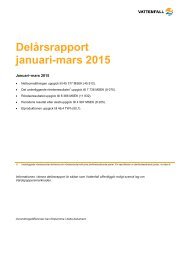2014-global-go-to-think-tank-index-22012015_1
2014-global-go-to-think-tank-index-22012015_1
2014-global-go-to-think-tank-index-22012015_1
- No tags were found...
Create successful ePaper yourself
Turn your PDF publications into a flip-book with our unique Google optimized e-Paper software.
I. Dramatic Shifts in Funding Patterns: National, regional, and local <strong>go</strong>vernments have cut<br />
their funding for public policy research while corporations and private foundations have limited<br />
their grant-making <strong>to</strong> project-specific support. The 2008 economic crisis sparked a considerable<br />
shift in sources of <strong>think</strong>-<strong>tank</strong> funding. According <strong>to</strong> Alejanro Chafuen’s “Think Tanks for<br />
Freedom: A Snapshot of the U.S. Market,” foundations served as the largest source of support <strong>to</strong><br />
<strong>think</strong> <strong>tank</strong>s until 2011. Throughout the last three years, however, donations made by individuals<br />
have replaced foundations as the most prominent source of funding. On average, corporations<br />
contribute approximately 10 percent of the revenue granted <strong>to</strong> the institutes that participated<br />
within Chafuen’s sample. This is down from 18 percent since 2000. Roughly half of the<br />
organizations reported that individual donors are the largest source of support. Just 2 percent of<br />
institutional funding can be attributed <strong>to</strong> sources other than individuals (48 percent) and<br />
foundations (40 percent), most of which are magazine subscriptions <strong>to</strong> <strong>think</strong> <strong>tank</strong> publications. 69<br />
Decreased funding and operating support has put <strong>think</strong> <strong>tank</strong>s at risk of supporting the status quo<br />
in policy debate, rather than providing alternatives. 70 Nobel laureates Professor James Rothman<br />
of Yale University, Professor Randy Sheckman of the University of California, Berkeley, and<br />
Professor Thomas Suedhof of Stanford University say that <strong>go</strong>vernment budget cuts threaten<br />
research and undermine the overall outcomes of the institutions’ research. 71 Think <strong>tank</strong>s in<br />
Central America, Central and South Asia, Sub-Saharan African and Central and Eastern Europe<br />
have been particularly hard-hit by the economic downturn, both for economic reasons and<br />
because many of these countries lack the local funding options available <strong>to</strong> <strong>think</strong> <strong>tank</strong>s elsewhere<br />
because of a weaker culture of philanthropy. 72<br />
Although diminished funding may perhaps jeopardize innovation with respect <strong>to</strong> policy research<br />
and prescriptions, it is equally important <strong>to</strong> recognize that funding of any amount tends <strong>to</strong><br />
influence the particular research agenda that a <strong>think</strong> <strong>tank</strong> pursues. It is, therefore, critical that<br />
policy institutes implement the systems and procedures necessary <strong>to</strong> safeguard the integrity and<br />
independence of the work they produce. In addition <strong>to</strong> such internal measures, it is suggested that<br />
<strong>think</strong> <strong>tank</strong>s maintain a wide variety and a large number of donors, so as <strong>to</strong> further avoid a<br />
situation in which those whom comprise these policy institutes feel beholden <strong>to</strong> <strong>go</strong>vernment or<br />
other narrow special interests. 73 Think <strong>tank</strong>s are often viewed as non-partisan, non-biased<br />
sources, though the sources of funding can influence a <strong>think</strong> <strong>tank</strong>’s focus. Kathleen Clark, a<br />
professor at Washing<strong>to</strong>n University and political ethics expert said, “If you’re a lobbyist,<br />
whatever you say is heavily discounted. If a <strong>think</strong> <strong>tank</strong> is saying it, it obviously sounds a lot<br />
69 Alejanro Chafuen, Think Tanks For Freedom: A Snapshot Of The U.S. Market. Forbes. Feb. 2, 2013.<br />
<br />
70 Euro Think Tank Summit Report, from Regional and International of 20 November 2012.<br />
71 Elizabeth Lopat<strong>to</strong>, "American Nobel Winners Say Research Threatened by Cuts," Bloomberg, 8<br />
Oc<strong>to</strong>ber 2013, accessed 5 January <strong>2014</strong>, http://www.bloomberg.com/news/2013-10-08/american-nobelwinners-fear-for-research-as-funding-cut.html.<br />
72 Makoni, Munyaradzi. "African Think Tanks Feel Funding Pinch."ResearchResearch.com.<br />
ResearchResearch Limited, 28 Jan. 2013. Web. 25 Oct. 2013.<br />
73 McGann, James. “Think Tanks: Catalyst for Ideas and Action.” Diplomatic Courier.<br />
27




